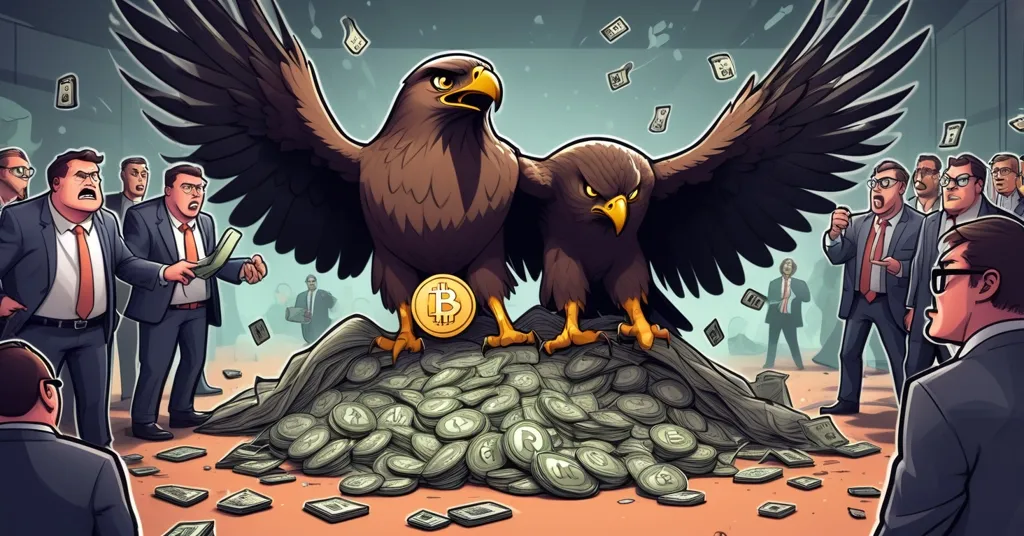Hawk Tuah Girl Hailey Welch Sued in Solana Memecoin Fraud Scandal over HAWK Token Collapse

Hawk Tuah Girl Hailey Welch in Solana Memecoin Scandal: Lawsuit Alleges Fraud
Hailey Welch, the viral internet star known as the “Hawk Tuah girl,” has landed in the middle of a federal class action lawsuit over a Solana-based memecoin called HAWK. A seemingly innocent celebrity endorsement has morphed into a full-blown legal battle, with accusations of fraud, misrepresentation, and a blatant rug pull that left investors high and dry. Welch, her manager, and her company are now defendants in a case that exposes the seedy underbelly of hype-driven crypto schemes.
- Legal Heat: Hailey Welch, manager Jonnie Forster, and 16 Minutes LLC are named in a lawsuit over the HAWK memecoin collapse.
- Money Trail: Welch allegedly pocketed $325,000 to promote HAWK, which nosedived 93% in value after launch.
- Scam Signals: Insiders dumped $1.27 million in tokens, with blockchain forensics tying them to other memecoin frauds.
- Wider Fallout: This fiasco deepens distrust in crypto, spotlighting DeFi’s unchecked risks.
The HAWK Token Disaster: From Hype to Wipeout
Let’s break down the chaos. If you’re new to this, a memecoin is a type of cryptocurrency often spawned from internet memes or viral trends, more about speculation than substance. Picture Dogecoin, but usually with less staying power and a lot more sketch. HAWK, likely named after Welch’s infamous “Hawk Tuah” catchphrase, launched on Solana—a blockchain platform that’s a favorite for token creators thanks to its sub-second transaction speeds and fees so low they’re basically pocket change (often under $0.01). This makes Solana a hotspot for quick launches, whether they’re legit or a total sham. HAWK blasted off, hitting a jaw-dropping $490 million market cap in just 15 minutes. Then, faster than you can say “rug pull,” it crashed 93%, leaving everyday investors with nothing but regret.
The collapse wasn’t some unfortunate accident. Burwick Law, the firm behind the lawsuit, lays out a brutal case: insiders hyped HAWK to inflate its price, then sold off $1.27 million worth of tokens at the peak, tanking its value in a classic “rug pull.” In crypto terms, that’s when creators or early holders pump up a token with marketing, only to dump their stash and vanish, screwing over everyone else. Blockchain forensics—think of it as detective work tracing transactions on Solana’s public ledger—shows the wallets involved in HAWK are linked to other memecoin scams like LIBRA, M3M3, AIAI, and TRUMP snipe. This isn’t a fluke; it’s a serial hustle exploiting the lawless vibe of decentralized finance (DeFi), where financial tools run on blockchains without traditional oversight, often leaving investors exposed until it’s too late. For more on the legal battle surrounding this fiasco, check out the detailed coverage on the Hawk Tuah memecoin lawsuit.
Welch’s Involvement: Viral Star or Willing Accomplice?
Now, let’s focus on Hailey Welch herself. Legal documents claim she was paid a cool $325,000 to push HAWK—$125,000 upfront, plus $200,000 tied to promotional benchmarks. Her company, 16 Minutes LLC, signed a deal with Memetic Labs five months before the launch, a so-called Meme Token Creation and Monetization Agreement that handed Memetic Labs a 50% slice of lifetime trading profits. That’s not a spontaneous shoutout; it’s a structured play. Welch used her viral clout to market HAWK across social media, giving a veneer of legitimacy to what the lawsuit calls a doomed-from-the-start scheme designed to mislead her fans and followers.
At first, Burwick Law didn’t target Welch, focusing on other players like Clinton So and OverHere Limited to recover client losses. But as her role became clearer, they updated the suit to rope in Welch, her manager Jonnie Forster, and 16 Minutes LLC. Their message is loud: if you helped peddle this scam, you’re on the hook. Welch hasn’t made detailed public statements yet, leaving us to speculate—was she in on the grift, or just a viral pawn used by savvier fraudsters? Either way, ignorance isn’t a shield. If you’re cashing six-figure checks to endorse a token, you’ve got a duty to know what the hell you’re backing—or at least surround yourself with people who do.
Solana’s Memecoin Madness: Innovation or Infestation?
Stepping back, Solana’s role in this mess is worth dissecting. Its tech is impressive—transactions settle almost instantly, unlike Bitcoin’s deliberate minutes-long confirmations, and costs are negligible, making it a playground for token launches. This speed and affordability draw innovators, but also swarms of scammers. Memecoins can be a laugh, even empowering, letting anyone bet on a cultural blip—Dogecoin’s occasional charity stunts prove there’s some good in the mix. But more often, they’re digital traps, especially on Solana, where thousands of tokens pop up monthly, many fizzling out or rug-pulling within days. HAWK isn’t an outlier; it’s a symptom of a platform where ease of creation outpaces accountability.
Compare this to past flops like the 2021 Squid Game token, a Solana-based memecoin tied to the Netflix series that swindled millions in a near-identical rug pull. Same script: viral hook, celebrity or cultural hype, insider dump. DeFi’s lack of guardrails means there’s little to stop these hits until the damage is done. Solana isn’t the villain—its tech enables real experimentation—but it’s getting a bad rep as a scammer’s paradise. And frankly, that’s a damn shame for a blockchain with so much potential.
Bitcoin Maximalist Lens: Memecoins as Crypto’s Black Eye
Here at Let’s Talk, Bitcoin, we view this circus with a heavy dose of skepticism. Bitcoin stands tall as the pinnacle of decentralization, a true store of value built on unshakable principles of sound money, not some meme-of-the-week nonsense. Its slower pace and higher fees are by design, prioritizing security over flash, aiming to be digital gold rather than a Vegas slot machine. We’re not oblivious to the niches other blockchains fill—Ethereum powers sophisticated apps, Solana fuels fast-paced trials. But when “trials” turn into fraud-fests like HAWK, they tarnish the whole industry. Crypto won’t win over the masses if every hyped token is a potential scam. The grifters behind HAWK and their kind need to be exposed, sued, and shamed out of existence. No tolerance for this garbage.
Celebrity Crypto Fails: A Broken Record of Hype and Hurt
Welch isn’t breaking new ground in the celebrity crypto hall of shame. Kim Kardashian got slapped with SEC fines in 2022 for touting Ethereum Max—a token that cratered—without disclosing her payment. The pattern is predictable: stars lend their name to dodgy projects, fans buy in on trust, prices spike, insiders cash out, and the little guy loses. It’s exacerbated by DeFi’s opacity—red flags like anonymous devs or “locked liquidity” (a safeguard against dumps) are missed by novices dazzled by fame. Until celebrities face real heat for these endorsements, or the community demands better, this cycle will keep spinning, dragging crypto’s reputation through the mud.
Dodging the Next Rug Pull: Tips for Crypto Survival
How do you steer clear of the next HAWK disaster? Start with skepticism. Watch for warning signs: faceless teams, wild “moonshot” promises, or tokens riding short-lived fads. Dig into token distribution using tools like Solscan—if a handful of wallets own most of the supply, it’s a dump waiting to happen. Prioritize projects with actual use cases over pure hype. And the golden rule? Never bet more than you can afford to lose—crypto’s a wild ride even without scams. Knowledge is power in a space where freedom and fraud walk hand in hand.
Crypto’s Crossroads: Freedom Must Meet Accountability
This HAWK lawsuit transcends one token or one influencer—it’s a blaring alarm about decentralization’s growing pains. We’re all-in on effective accelerationism, advocating for bold, fast-moving innovation to overhaul finance. Bitcoin paves the way as the future of money, while altcoins like Solana carve out unique spaces we can’t dismiss. But with great freedom comes great responsibility. Scams like HAWK aren’t just setbacks; they alienate the newcomers we need for mainstream adoption. Education, transparency, and community vigilance are critical. Maybe even targeted regulation, if it doesn’t choke progress. Let’s champion the breakthroughs but crush the con artists. Crypto’s potential is limitless—let’s not let greed screw it up.
Key Takeaways and Questions
- What sparked Hailey Welch’s role in the HAWK lawsuit?
Welch was paid a reported $325,000 to promote the HAWK memecoin on social media, an endorsement the lawsuit says deceived investors into a failing scheme. - Was the HAWK token collapse a planned scam?
The legal filings say yes, alleging a rug pull where insiders sold $1.27 million in tokens at the peak, a claim backed by blockchain forensics showing premeditated dumps. - Do HAWK’s creators have ties to other crypto frauds?
Blockchain analysis links HAWK insiders to earlier memecoin rug pulls like LIBRA and M3M3, revealing a network of repeat offenders on Solana. - Why do celebrity crypto endorsements keep exploding?
Celebrities often boost questionable tokens with unearned trust, pulling in naive fans who miss warning signs, while facing little upfront accountability for flops. - How can investors shield themselves from memecoin scams?
Spot red flags like hidden teams, check token ownership on platforms like Solscan, and avoid hype traps without real value or clear developer transparency. - What does this scandal signal for crypto’s growth?
It heightens distrust among potential adopters, stressing the urgent need for education and accountability so scams don’t drown out decentralization’s promise.



